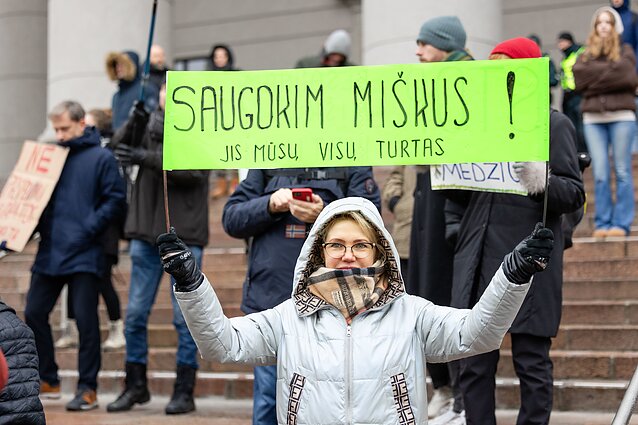Protesters in Vilnius call for stop to deforestation
Around 100 people gathered in the square by the Lithuanian parliament in Vilnius to protest against clear-cutting of forests in protected areas.
The protesters carried placards saying “Amid warming climate, NO to Lithuanian deforestation”, “Let’s not cut the branch on which we are sitting”, “Gentvilas, stop the genocide of Lithuanian forests”.
The organisers of the rally claim that Lithuania’s forests are not adequately protected.
One of the organisers, artist Kasparas Bagdonas, told BNS that the protests would be held until the forests were properly protected and clear-cutting was stopped.
“If they don’t hear us this time, they will hear us at the next protest, which we are already planning and organising. If they don’t hear us at the next one, they will hear us at the one after that. Our idea is to organise at least one protest a month until there is some kind of change,” Bagdonas told BNS.
“We are planning not only to protest, but also to go to logging sites, to record which trees have been cut down,” he added.
Business interests above society and nature
“I have come [to the rally] because, to put it mildly, we see a genocide committed against nature,” on protester, 55-year-old energy engineer Alvydas Augustinaitis, told BNS.
Rugilė Sitaitė, a school student, said that forest cutting policies serve the interests of business, not the interests of nature and society.
“I don’t like what is happening to our forests and our woods. [...] I hope that we can achieve the goal of not having our forests and woods cut down, not having our forests and woods sold,” the 18-year-old told BNS.
According to the organisers, more than 4,000 hectares of forest were to be cleared this year as part of sanitary logging.
Lina Paškevičiūtė, chairwoman of the Environmental Coalition, says that most of Lithuania’s forestry is focused on clear-cutting, which is unfriendly to the environment.
“We don’t see the statistics [...] what is the area of the forest. It’s not about whether there is more or less forest area, it’s what kind of forest it is. More than 80 percent of Lithuania’s forests are now oriented towards this kind of forestry: plant, grow, cut. This is forestry that is unfriendly to nature and unfriendly to the recreational environment,” Paškevičiūtė told BNS.
According to her, Environment Minister Simonas Gentvilas is not presenting the statistics that would show not just the area of forests, but also their quality.
“Now they tell us: don’t worry, forests will grow back. But what exactly will grow back? Will they plant fir trees with an oak at the front? When will this forest be suitable for recreation? In 50 years?” asked Paškevičiūtė.
Minister: forests not in danger
Environment Minister Gentvilas says it is not true that forest cutting is too intense in Lithuania. He admits, however, that sanitary logging in protected areas could be more sustainable.
“In Lithuania, 70 percent of the annual increase is cleared and Lithuania is a sustainable country. Lithuania has twice as much forest area as it did between the wars, three times as much timber stockpiled, and every year a third of the increase is left for future generations, which means that Lithuania is increasing its forest area every year,” the minister told journalists on Friday.
“I want to loudly refute the myth that Lithuania is logging too intensively,” Gentvilas added.
After the Environment Ministry announced on Tuesday that eight ongoing clear-cutting operations in the genetic reserves of the Punios Šilas had been suspended, the Baltic Environment Forum, a non-governmental organisation, said that the clear-cutting operations had been completed.
The ministry has initiated amendments to the forest felling rules, which would more strictly regulate clear felling. They are expected to be adopted in early December and will ensure that when pests infect a forest, only the dead trees get cut.
In early October, the activists reported logging in the protected Šimoniai Forest. In response, the Environment Ministry suspended two logging permits and the Special Investigation Service launched a probe.

